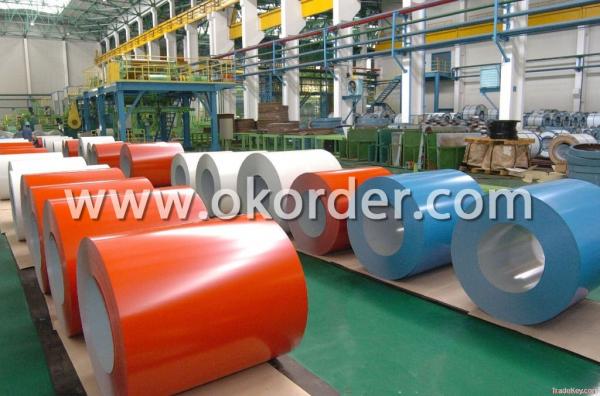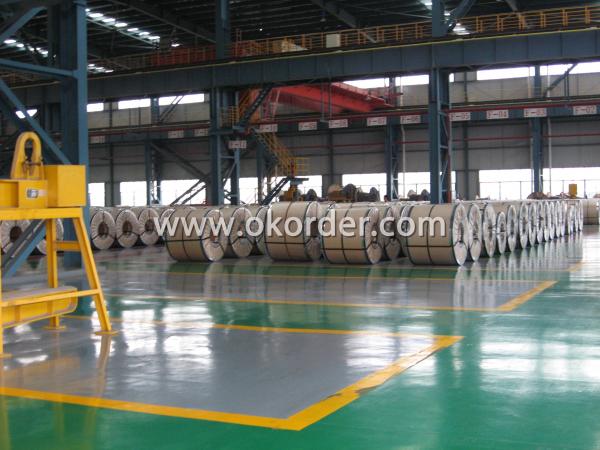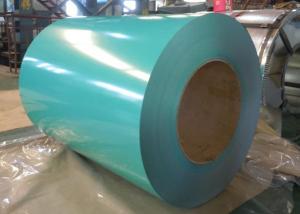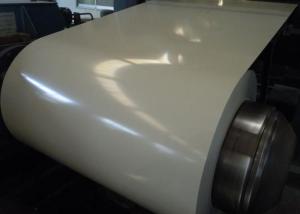Best Quality for Prepainted Aluzinc Steel Coil
- Loading Port:
- China Main Port
- Payment Terms:
- T/T or L/C
- Min Order Qty:
- 50mt m.t.
- Supply Capability:
- 100000 mt/year m.t./month
OKorder Service Pledge
OKorder Financial Service
You Might Also Like
General Informationof Prepainted Aluzinc Steel Coil
|
Thickness 0.23-1.2mm (BMT) |
|
Width 900-1250mm |
|
Alu-zinc Coating: 50-150g/m2 |
|
Internal Diameter 508mm or 610mm |
|
Color According to RAL color fan |
|
Coil Weight 4-8MT |
|
Quality Commercial and structural quality |
|
Paint Polyester paint for topside, epoxy for reverse |
|
Standard JIS G 3322, ASTM A755M, EN 10169 |
|
Base Steel Grade SGCC, SGCD, DX51D+Z DX52D+Z; S200GD, S220GD, S280GD,S350GD,CS,FS,SS |
Technical Data of Prepainted Aluzinc Steel Coil
|
Chemical Composition |
C |
Si |
Mn |
P |
S |
|
0.04-0.06% |
0.01-0.03% |
0.18-0.22% |
0.014-0.016% |
0.006%-0.009% |
|
Technical Data | |
|
Yield Strength |
(Mpa) 280-320 |
|
Tensile Strength |
(Mpa) 340-390 |
|
Elongation |
20%-30% |
|
Reverse Impact |
9J |
|
T-bending |
≥2T |
|
Pencil Hardness |
≥2H |
|
Duration Of Salt Spray Test |
500 H |
|
Bending At 180 Degree |
No crack, purling and fraction |
Package of Prepainted Aluzinc Steel Coil
Full wrapped with anti-damped paper inside, iron sheet wrapped outside, and bundled by iron strips
Applicationof Prepainted Aluzinc Steel Coil
It can be widely used in transportation, light industry, civil usage and farming. It is also the perfect building material in construction for making steel roofing, corrugate sheet, sandwich panel for wall or roofing, facade wall, shutters and home appliance.


- Q:How are steel coils used in the manufacturing of fuel systems?
- Steel coils are commonly used in the manufacturing of fuel systems for their strength, durability, and resistance to heat and corrosion. These coils are typically formed into various components such as fuel tanks, pipelines, and fuel lines. The steel coils provide structural support and ensure the integrity of the fuel system, enabling safe and efficient transportation, storage, and delivery of fuel.
- Q:How do steel coils contribute to energy efficiency in transportation?
- There are several ways in which steel coils help improve energy efficiency in transportation. To begin with, steel coils are lightweight and have a high strength-to-weight ratio. This means that they require less steel material to carry the same load compared to other materials like wood or concrete. As a result, the overall weight of the transport vehicle is reduced, leading to lower fuel consumption and emissions. Furthermore, steel coils are extremely durable and can withstand harsh transportation conditions. They are highly resistant to corrosion, impact, and fatigue, ensuring a longer lifespan for the transport vehicle. This durability reduces the need for frequent repairs or replacements, resulting in reduced energy consumption and material waste. Moreover, steel coils are easily handled and transported. Due to their compact and standardized size, they can be effortlessly loaded and unloaded from trucks, trains, or ships. This efficiency in handling reduces the time and energy required for loading and unloading operations, ultimately increasing overall transportation efficiency. Additionally, steel coils can be efficiently stacked and stored, maximizing the utilization of available space in transport vehicles. This reduces the number of trips needed to transport the same amount of goods, resulting in less energy consumption and lower transportation costs. Lastly, steel is a highly recyclable material. At the end of their life cycle, steel coils can be easily recycled and used to produce new steel products. This reduces the demand for raw materials and the energy required for manufacturing new products, thereby contributing to overall energy efficiency in transportation. In conclusion, steel coils play a crucial role in enhancing energy efficiency in transportation. Their lightweight, durable, easy-to-handle, and recyclable nature leads to decreased fuel consumption, lower emissions, reduced maintenance needs, efficient use of space, and minimized material waste. All of these factors contribute to a more sustainable and energy-efficient transportation system.
- Q:Are steel or graphite clubs better?
- Prosimmon X30 Hybrid Full Golf Club Package I purchased these clubs as a birthday gift for my fiance' who has been planning to learn the game. We started taking lessons together and these clubs are great for him as a beginner. He loves this set and is really looking forward to getting better at the game so that he can really get some good use out of them. Great set for the price! Perfect for beginners!
- Q:i know stainless steel swords are decoration, what metal is ok for a sword that is usable
- Why the interest in a 'usable' sword ~~ are you really going to use it?
- Q:How are steel coils used in the construction industry?
- Steel coils are commonly used in the construction industry for various purposes such as fabricating structural components, manufacturing steel pipes, and producing metal roofing and siding materials. The coils are unrolled and processed into different shapes and sizes to meet the specific requirements of construction projects.
- Q:i need a company that sells strong steel doors because my neighbors apartment was broken into. I need a strong steel door for the outside of the home, where you first enter. please list places in the US, or in NY.
- Actually, the best doors are fiberglass. Steel doors are not solid steel. The steel is a skin, over framing and insulation. The cheaper doors have thinner steel skins.. That is why they get dented. Go to a real lumber yard. Home Depot and Lowes specialize in low price, not high quality. I use a brand, called Thermatru, that is available in New England. I am sure there are comparable brands. I don't care for Stanley. Stanley makes hammers. They bought a door factory and stick their name on the doors. Good luck.
- Q:What are the different coil winding methods used for steel coils?
- There are several different coil winding methods used for steel coils, each with its own advantages and applications. 1. Layer winding: This is the most common method used for steel coils. It involves winding the steel strip or sheet in concentric layers, one on top of the other, to form a coil. This method is ideal for thin, narrow strips and provides good stability and strength to the coil. 2. Cross winding: In this method, the steel strip is wound in a crisscross pattern, alternating the direction of each layer. This helps to distribute the stress evenly across the coil and prevents the coil from becoming unstable. Cross winding is commonly used for thicker or wider steel strips. 3. Spiral winding: This method involves winding the steel strip in a spiral pattern, forming a coil with a gradual increase in diameter. Spiral winding is often used for large or heavy steel coils, as it allows for easy handling and transportation. It also provides good stability and prevents the coil from collapsing. 4. Toroidal winding: This method is used for producing toroidal or donut-shaped coils. The steel strip is wound in a circular path, with each layer placed inside the previous one. Toroidal winding is commonly used in applications such as transformers, where the coil needs to have a specific shape and size. 5. Interleaved winding: This method involves interleaving two or more steel strips together during the winding process. Interleaved winding is used to produce composite coils with different materials or thicknesses. It provides enhanced strength, stability, and allows for customized designs. Each of these coil winding methods has its own advantages and is used based on the specific requirements of the steel coil application. The choice of method depends on factors such as strip thickness, width, tensile strength, and desired coil properties.
- Q:How are steel coils processed for painting or coating?
- Steel coils are typically processed for painting or coating through a series of steps. First, the coils are cleaned to remove any dirt, oil, or rust. This is usually done through a chemical cleaning process or by using mechanical methods such as shot blasting. Next, the coils are pre-treated to enhance adhesion and corrosion resistance. This can involve applying a conversion coating or a primer. Finally, the coils are painted or coated using a variety of methods such as roll coating, spray coating, or electrostatic coating. The specific process depends on the desired finish and application requirements.
- Q:How are galvanized steel coils different from regular steel coils?
- Galvanized steel coils are different from regular steel coils as they are coated with a layer of zinc to prevent corrosion and rust formation. This zinc coating acts as a protective barrier, increasing the longevity and durability of the steel coils, especially in harsh environmental conditions.
- Q:What are the applications of steel coils in automotive manufacturing?
- Steel coils have a wide range of applications in automotive manufacturing due to their unique properties and characteristics. They are commonly used in various parts and components of vehicles, offering numerous benefits and contributing to the overall performance, safety, and reliability of automobiles. One of the primary applications of steel coils in automotive manufacturing is in the production of body panels. Steel coils are used to create the outer body structure of vehicles, including doors, hoods, fenders, and roofs. The high strength and durability of steel make it an ideal material for these components, as it provides protection against impacts and enhances the overall structural integrity of the vehicle. Steel coils are also used in the manufacturing of automotive chassis and frames. The strong and rigid nature of steel makes it an excellent choice for these critical components, as it can withstand heavy loads and provide stability to the vehicle. Steel coils ensure that the chassis and frames have the necessary strength and stiffness to support the weight of the vehicle and withstand the forces experienced during driving. Moreover, steel coils are utilized in the production of various suspension and steering components, such as springs, stabilizer bars, and control arms. These components require high strength and resistance to fatigue, as they are subjected to constant stress and vibrations. Steel coils provide the necessary toughness and flexibility to these parts, ensuring smooth and controlled vehicle handling. In addition, steel coils are used in the manufacturing of engine parts and exhaust systems. The high-temperature resistance and corrosion resistance of steel make it an ideal material for these applications. Steel coils are formed into various shapes, such as tubes and pipes, and used to create exhaust manifolds, catalytic converters, and mufflers. They play a crucial role in improving the performance and efficiency of the engine, as well as reducing harmful emissions. Overall, steel coils are vital in automotive manufacturing due to their strength, durability, and versatility. They are used in the production of body panels, chassis, suspension components, engine parts, and exhaust systems. The use of steel coils in these applications ensures that vehicles are safe, reliable, and perform optimally, making them an indispensable material in the automotive industry.
1. Manufacturer Overview |
|
|---|---|
| Location | Jiangsu, China |
| Year Established | 2003 |
| Annual Output Value | US$1 Million - US$2.5 Million |
| Main Markets | Southern Asia; America; South America; Eastern Europe |
| Company Certifications | ISO 9000 ISO 14000 OHSAS 18000 |
2. Manufacturer Certificates |
|
|---|---|
| a) Certification Name | |
| Range | |
| Reference | |
| Validity Period | |
3. Manufacturer Capability |
|
|---|---|
| a)Trade Capacity | |
| Nearest Port | Shanghai |
| Export Percentage | 1% - 10% |
| No.of Employees in Trade Department | 100 People |
| Language Spoken: | English; Chinese |
| b)Factory Information | |
| Factory Size: | Above 200,000 square meters |
| No. of Production Lines | 14 |
| Contract Manufacturing | Design Service Offered |
| Product Price Range | Average |
Send your message to us
Best Quality for Prepainted Aluzinc Steel Coil
- Loading Port:
- China Main Port
- Payment Terms:
- T/T or L/C
- Min Order Qty:
- 50mt m.t.
- Supply Capability:
- 100000 mt/year m.t./month
OKorder Service Pledge
OKorder Financial Service
Similar products
New products
Hot products
Related keywords



























